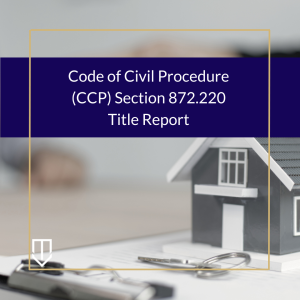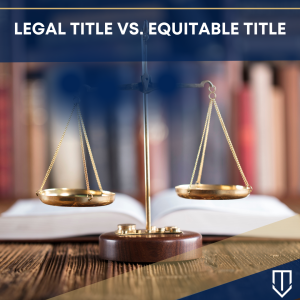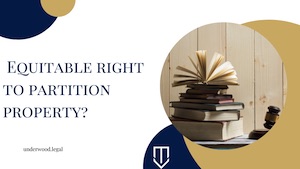 Exceptions in a title report, also called a preliminary title report, make a potential buyer aware of issues with the property. Exceptions are important as they may limit what title insurance a buyer is eligible for and may prevent the sale of property altogether.
Exceptions in a title report, also called a preliminary title report, make a potential buyer aware of issues with the property. Exceptions are important as they may limit what title insurance a buyer is eligible for and may prevent the sale of property altogether.
What is a title report?
A title report is used when conducting a sale or purchase of real estate to help a buyer make an informed decision. A title report is provided by a title insurance company after escrow is opened. It is a document that includes details about the property’s owners, recorded liens against the property, other encumbrances or debts, and conditions. (Ins. Code. § 12340.11.)
 California Partition Law Blog
California Partition Law Blog


 When it comes to real estate transactions, ensuring a clean and clear title is essential. However, what happens if a property is sold without a perfect title, only for the seller to acquire the missing rights or interests later? This scenario is where the After Acquired Title Doctrine comes into play. In this blog, we’ll discuss what this doctrine entails, its implications for buyers and sellers, and how it impacts real estate transactions.
When it comes to real estate transactions, ensuring a clean and clear title is essential. However, what happens if a property is sold without a perfect title, only for the seller to acquire the missing rights or interests later? This scenario is where the After Acquired Title Doctrine comes into play. In this blog, we’ll discuss what this doctrine entails, its implications for buyers and sellers, and how it impacts real estate transactions. Before undertaking litigation over real estate in California, title insurance can help to provide clarity as to important ownership questions. Title insurance is not just nice to have, in many instances, the law specifically envisions that the parties will obtain a title report of some type. For example,
Before undertaking litigation over real estate in California, title insurance can help to provide clarity as to important ownership questions. Title insurance is not just nice to have, in many instances, the law specifically envisions that the parties will obtain a title report of some type. For example,  The California Partition Law begins at Code of Civil Procedure section 872.010 and ends at Code of Civil Procedure section 874.323. Section 872.220 requires that the plaintiff state the existence and location of a title report if they have procured one. A title report includes a preliminary report, guarantee, binder, or policy of title insurance. (CCP § 872.010 subd. (e).)
The California Partition Law begins at Code of Civil Procedure section 872.010 and ends at Code of Civil Procedure section 874.323. Section 872.220 requires that the plaintiff state the existence and location of a title report if they have procured one. A title report includes a preliminary report, guarantee, binder, or policy of title insurance. (CCP § 872.010 subd. (e).) The significance of the differences between legal and equitable title is an outright confusing topic, requiring some knowledge of constructive trusts, beneficial interests, and seller’s liens. That said, the concept can be made digestible by boiling it down to its essential elements. When done, this simplification reveals how often we encounter both types of titles in common real estate transactions.
The significance of the differences between legal and equitable title is an outright confusing topic, requiring some knowledge of constructive trusts, beneficial interests, and seller’s liens. That said, the concept can be made digestible by boiling it down to its essential elements. When done, this simplification reveals how often we encounter both types of titles in common real estate transactions.